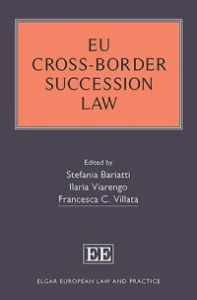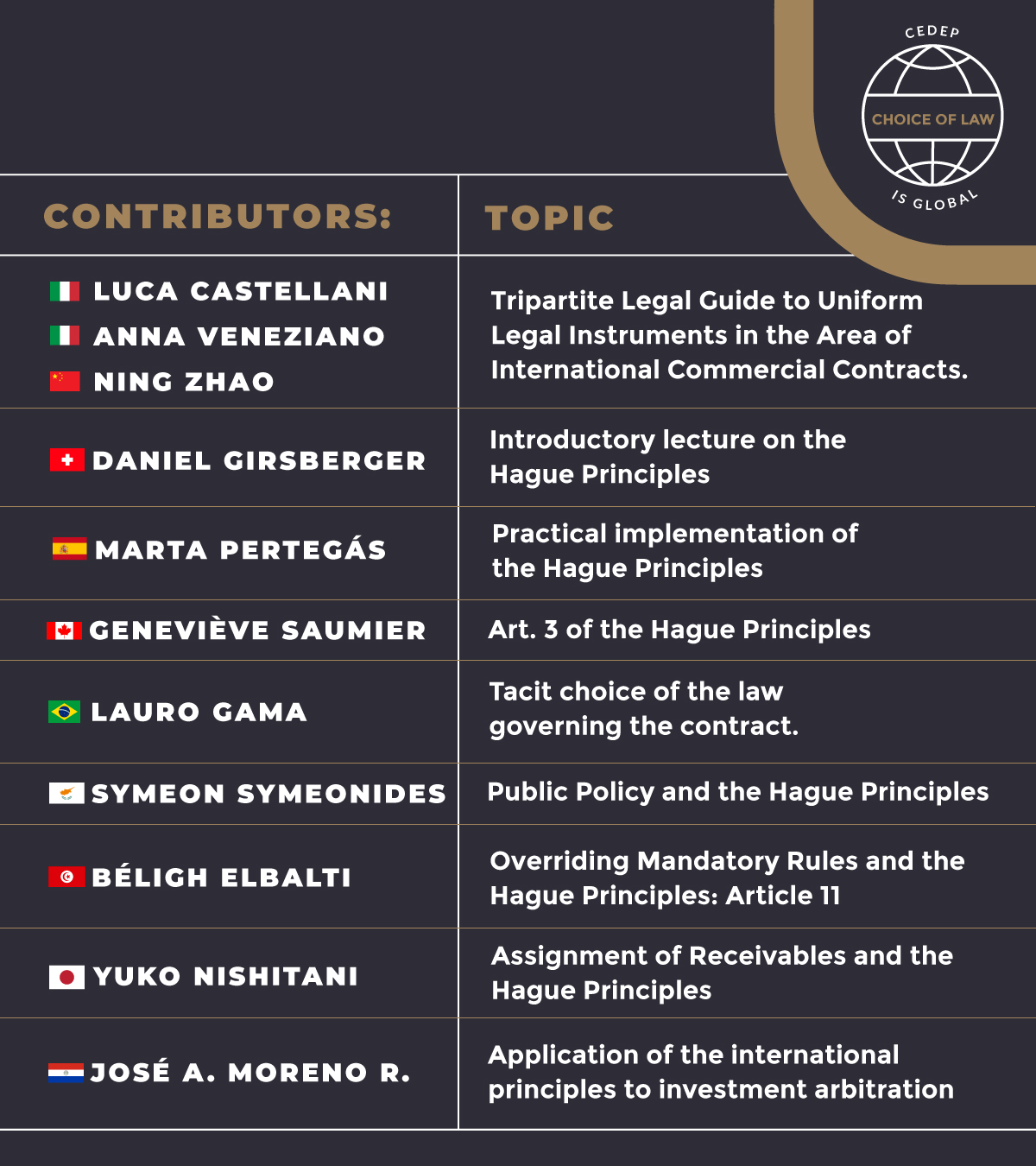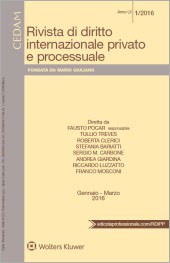The latest issue of the „Praxis des Internationalen Privat- und Verfahrensrechts (IPRax)“ features the following articles:
(These abstracts can also be found at the IPRax-website under the following link: https://www.iprax.de/en/contents/)
P. Hay: On the Road to a Third American Restatement of Conflicts Law
American private international law (Conflict of Laws, “Conflicts Law”) addresses procedure (jurisdiction of courts, recognition of judgments) as well as the choice of the applicable law. The last of these has been a mystery to many scholars and practitioners – indeed, even in the United States. Since 2014 the American Law Institute now seeks to draft a new “Restatement” – the Third – of the subject, with the aim to clarify and perhaps to bring more uniformity to the resolution of conflict-of-laws problems. The following comments first recall the role of restatements in American law. The second part provides some historical background (and an assessment of the current state of American conflicts law, as it relates to choice of law) in light of the Second Restatement, which was promulgated in 1971. The third part addresses the changes in methodology adopted and some of the rules so far proposed by the drafters of the future new Restatement. Examples drawn from existing drafts of new provisions may serve to venture some evaluation of these proposed changes. In all of this, it is important to bear in mind that much work still lies ahead: it took 19 years (1952–1971) to complete the Second Restatement.
L. Hübner: Climate change litigation at the interface of private and public law – the foreign permit
The article deals with the interplay of private international law, substantive law, and public law in the realm of international environmental liability. It focuses on the question, whether the present dogmatic solution for the cognizance of foreign permits in “resident scenarios” can be extended to climate change scenarios. Since there exists significant doubts as to the transferability of this concept, the article considers potential solutions under European and public international law.
C. Kohler: Recognition of status and free movement of persons in the EU
In Case C-490/20, V.M.A., the ECJ obliged Bulgaria to recognise the Spanish birth certificate of a child in which two female EU citizens, married to each other, were named as the child’s parents, as far as the implementation of the free movement of persons under EU law was concerned, but left the determination of the family law effects of the certificate to Bulgarian law. However, the judgment extends the effects of the recognition to all rights founded in Union law, including in particular the right of the mobile Union citizen to lead a “normal family life” after returning to his or her country of origin. This gives the ECJ the leverage to place further effects of recognition in public law and private law under the protection of the primary and fundamental rights guarantees of EU law without regard to the law applicable under the conflict rules of the host Member State. The author analyses these statements of the judgment in the light of European and international developments, which show an advance of the recognition method over the traditional method of referral to foreign law in private international law.
W. Hau: Interim relief against contracting authorities: classification as a civil and commercial matter, coordination of parallel proceedings and procedural autonomy of the Member States
After a Polish authority awarded the contract for the construction of a road to two Italian companies, a dispute arose between the contracting parties and eventually the contractors applied for provisional measures in both Poland and Bulgaria. Against this background, the ECJ, on a referral from the Bulgarian Supreme Court of Cassation, had to deal with the classification of the proceedings as a civil and commercial matter and the coordination of parallel interim relief proceedings in different Member States. The case also gave the ECJ reason to address some interesting aspects of international jurisdiction under Article 35 of the Brussels Ibis Regulation and the relationship between this provision and the procedural laws of the Member States.
M. Thon: Jurisdiction Clauses in General Terms and Conditions and in Case of Assignment
Choice of court agreements are one of the most important instruments of international civil procedure law. They are intended to render legal disputes plannable and predictable. The decision under discussion comes into conflict with these objectives. In DelayFix, the CJEU had to deal with the question of whether (1.) Art. 25 of the Brussels Ibis Regulation is to be interpreted as precluding a review of unfairness of jurisdiction clauses in accordance with Directive 93/13/EEC and whether (2.) an assignee as a third party is bound by a jurisdiction clause agreed by the original contracting parties. The first question is in considerable tension between consumer protection and the unification purpose of the Brussels Ibis Regulation considering that the Member States may adopt stricter rules. For the latter question, the CJEU makes it a prerequisite that the assignee is the successor to all the initial contracting party’s rights and obligations, which regularly occurs in the case of a transfer of contract, but not an assignment. In this respect, too, the CJEU’s decision must be critically appraised.
C.F. Nordmeier: International jurisdiction and foreign law in legal aid proceedings – enforcement counterclaims, section 293 German Code of Civil Procedure and the approval requirements of section 114 (1) German Code of Civil Procedure
The granting of legal aid in cases with cross-border implications can raise particular questions. The present article illustrates this with a maintenance law decision by the Civil Higher Regional Court of Saarbrücken. With regard to international jurisdiction, a distinction must be made between an enforcement counterclaim and a title counterclaim. The suspension of legal aid proceedings analogous to section 148 of the German Code of Civil Procedure with pending preliminary ruling proceedings before the European Court of Justice in a parallel case is possible. When investigating foreign law in accordance with section 293 of the German Code of Civil Procedure, the court may not limit itself to “pre-ascertaining” foreign law in legal aid proceedings. In principle, the party seeking legal aid is not obliged to provide information on the content of foreign law. If the desired decision needs to be enforced abroad and if this is not possible prospectively, the prosecution can be malicious. Regardless of their specific provenance, conflict-of-law rules under German law are not to be treated differently from domestic norms in legal aid proceedings.
R.A. Schütze: Security for costs under the Treaty of Friendship, Commerce and Navigation between the Federal Republic of Germany and the United States of America
The judgment of the Regional Court of Appeal Munich deals with the application of the German-American Treaty of Friendship, Commerce and Navigation as regards the obligation to provide security of costs in German civil procedure, especially the question whether a branch of plaintiff in Germany reliefs him from his obligation under section 110 German Code of Civil Procedure. The Court has based its judgment exclusively on article VI of the Treaty and section 6 and 7 of the protocol to it and comes to the conclusion that any branch of an American plaintiff in Germany reliefs him from the obligation to put security of costs.
Unfortunately, the interpretation of the term “branch” by the Court is not convincing.
The court has not taken into regard the ratio of section 110 German Code of Civil Procedure. The right approach would have been to distinguish whether the plaintiff demands in the German procedure claims stemming from an activity of the branch or from an activity of the main establishment.
P. Mankowski: Whom has the appeal under Art. 49 (2) Brussels Ibis Regulation to be (formally) lodged with in Germany?
Published appeal decisions in proceedings for the refusal of enforcement are a rare breed. Like almost anything in enforcement they have to strike a fine balance between formalism and pragmatism. In some respects, they necessarily reflect a co-operative relationship between the European and the national legislators. In detail there might still be tensions between those two layers. Such a technical issue as lodging the appeal to the correct addressee might put them to the test. It touches upon the delicate subject of the Member States’ procedural autonomy and its limits.
K. Beißel/B. Heiderhoff: The closer connection under Article 5 of the Hague Protocol 2007
According to Article 5 of the Hague Protocol 2007 a spouse may object to the application of the law of the creditor’s habitual residence (Article 3 of the Protocol) if the law of another state has a “closer connection” with the marriage. The Local Court of Flensburg had to decide whether there was a “closer connection” to the law of the state, in which the spouses had lived together for five years in the beginning of their marriage. The criteria which constitute a “closer connection” in the sense of Article 5 of the Protocol have received comparatively little discussion to date. However, for maintenance obligations, the circumstances at the end of marriage are decisive in order to ascertain the claim. Therefore, they should also have the greatest weight when determining the closest connection. This has not been taken into account by the Local Court of Flensburg, which applied the law of the former common habitual residence, the law of the United Arab Emirates (UAE).
The authors also take a critical stance towards the Court’s assessment of public policy under Article 13 of the Protocol. As the law of the UAE does not provide for any maintenance obligations of the wife (as opposed to maintenance obligations of the husband), the Court should not have denied a violation.
M. Lieberknecht: Transatlantic tug-of-war – The EU Blocking Statute’s prohibition to comply with US economic sanctions and its implications for the termination of contracts
In a recent preliminary ruling, the European Court of Justice has fleshed out the content and the limitations of the EU’s Blocking Statute prohibiting European companies from complying with certain U.S. economic sanctions with extraterritorial reach. The Court holds that this prohibition applies irrespective of whether an EU entity is subject to a specific order by U.S. authorities or merely practices anticipatory compliance. Moreover, the ruling clarifies that a termination of contract – including an ordinary termination without cause – infringes the prohibition if the terminating party’s intention is to comply with listed U.S. sanctions. As a result, such declarations may be void under the applicable substantive law. However, the Court also notes that civil courts must balance the Blocking Statute’s indirect effects on contractual relationships with the affected parties’ rights under the European Charter of Fundamental Rights.
E. Piovesani: The Falcone case: Conflict of laws issues on the right to a name and post-mortem personality rights
By the commented decision, the LG Frankfurt dismissed the action of two Italian claimants, namely the sister of the anti-mafia judge Falcone and the Falcone Foundation, for protection of their right to a name and the said judge’s postmortem personality right against the owner of a pizzeria in Frankfurt. The decision can be criticized on the grounds that the LG did not apply Italian law to single legal issues according to the relevant conflict of laws rules. The application of Italian law to such legal issues could possibly have led to a different result than that reached by the court.
M. Reimann: Jurisdiction in Product Liability Litigation: The US Supreme Court Finally Turns Against Corporate Defendants, Ford Motor Co. v. Montana Eighth Judicial District Court / Ford Motor Company v. Bandemer (2021)
In March of 2021, the US Supreme Court handed down yet another important decision on personal jurisdiction, once again in a transboundary product liability context. In the companion cases of Ford Motor Co. v. Eighth Montana District Court and Ford Motor Co. v. Bandemer, the Court subjected Ford to jurisdiction in states in which consumers had suffered accidents (allegedly due to a defect in their vehicles) even though their cars had been neither designed nor manufactured nor originally sold in the forum states. Since the cars had been brought there by consumers rather than via the regular channels of distribution, the “stream-of-commerce” theory previously employed in such cases could not help the plaintiffs (see World-Wide Volkswagen v. Woodson, 444 U.S. 286, 1980). Instead, the Court predicated jurisdiction primarily on the defendant’s extensive business activities in the forum states. The problem was that these in-state activities were not the cause of the plaintiffs’ harm: the defendant had done nothing the forum states that had contributed to the plaintiffs’ injuries. The Court nonetheless found the defendant’s business sufficiently “related” to the accidents to satisfy the requirement that the defendant’s contacts with the forum state be connected to the litigation there. The consequences of the decision are far-reaching: product manufacturers are subject to in personam jurisdiction wherever they are engaged in substantial business operations if a local resident suffers an accident involving merely the kind of product marketed in the forum state, regardless how the particular item involved arrived there. This is likely to apply against foreign corporations, especially automobile manufacturers, importing their products into the United States as well. The decision is more generally remarkable for three reasons. First, it represents the first (jurisdictional) victory of a consumer against a corporation in the Supreme Court in more than half-a-century. Second, the Court unanimously based in personam jurisdiction on the defendant’s extensive business activities in the forum state; the Court thus revived a predicate in the specific-in-personam context which it had soundly rejected for general in personam jurisdiction just a few years ago in Daimler v. Baumann (571 U.S. 117, 2014). Last, but not least, several of the Justices openly questioned whether corporations should continue to enjoy as much jurisdictional protection as they had in the past; remarkably these Justices hailed from the Court’s conservative camp. The decision may thus indicate that the days when the Supreme Court consistently protected corporations against assertions of personal jurisdiction by individuals may finally be over.
R. Geimer: Service to Foreign States During a Civil War: The Example of an Application for a Declaration of Enforceability of a Foreign Arbitral Award Against the Libyan State Under the New York Convention
With the present judgment, the UK Supreme Court confirms a first-instance decision according to which the application to enforce an ICC arbitral award against the state of Libya, and the later enforcement order (made ex parte), must have been formally served through the Foreign, Commonwealth and Development Office under the State Immunity Act 1978, despite the evacuation of the British Embassy due to the ongoing civil war. The majority decision fails to recognize the importance of the successful claimant’s right of access to justice under Art 6(1) ECHR and Art V of the 1958 New York Convention.
K. Bälz: Arbitration, national sovereignty and the public interest – The Egyptian Court of Cassation of 8 July 2021 (“Damietta Port”)
The question of whether disputes with the state may be submitted to arbitration is a recurrent topic of international arbitration law. In the decision Damietta Port Authority vs DIPCO, the subject of which is a dispute relating to a BOT-Agreement, the Egyptian Court of Cassation ruled that an arbitral award that (simultaneously) rules on the validity of an administrative act is null and void. The reason is that a (private) arbitral tribunal may not control the legality of an administrative decision and that the control of the legality of administrative action falls into the exclusive competency of the administrative judiciary. This also applies in case the legality of the administrative decision is a preliminary question in the arbitral proceedings. In that case, the arbitral tribunal is bound to suspend the proceedings and await the decision of the administrative court. The decision of the Egyptian Court of Cassation is in line with a more recent tendency in Egypt that is critical of arbitration and aims at removing disputes with the state from arbitration in order to preserve the “public interest”.
 EU Cross-Border Succession Law, edited by Stefania Bariatti, Ilaria Viarengo and Francesca C. Villata, was just released. Providing a comprehensive and dedicated analysis of the EU law on cross-border successions and benefitting from the insight of internationally renowned scholars, this volume is a welcome addition to the already thriving ‘Elgar European Law and Practice series’.
EU Cross-Border Succession Law, edited by Stefania Bariatti, Ilaria Viarengo and Francesca C. Villata, was just released. Providing a comprehensive and dedicated analysis of the EU law on cross-border successions and benefitting from the insight of internationally renowned scholars, this volume is a welcome addition to the already thriving ‘Elgar European Law and Practice series’.

